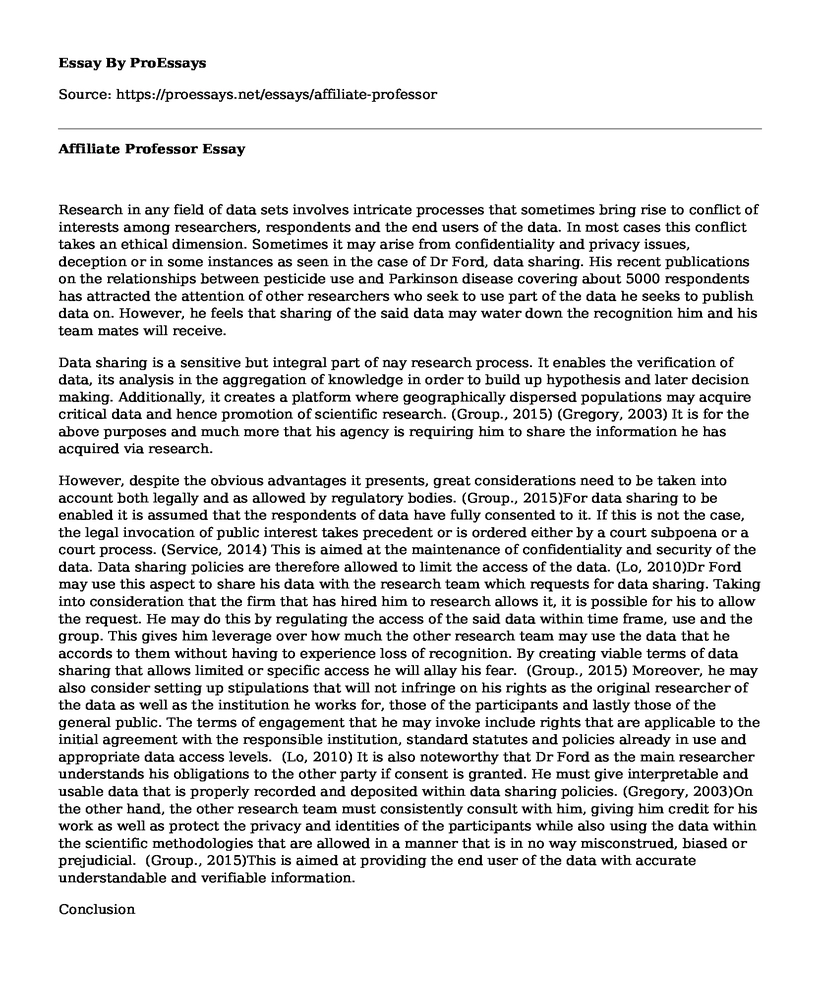Research in any field of data sets involves intricate processes that sometimes bring rise to conflict of interests among researchers, respondents and the end users of the data. In most cases this conflict takes an ethical dimension. Sometimes it may arise from confidentiality and privacy issues, deception or in some instances as seen in the case of Dr Ford, data sharing. His recent publications on the relationships between pesticide use and Parkinson disease covering about 5000 respondents has attracted the attention of other researchers who seek to use part of the data he seeks to publish data on. However, he feels that sharing of the said data may water down the recognition him and his team mates will receive.
Data sharing is a sensitive but integral part of nay research process. It enables the verification of data, its analysis in the aggregation of knowledge in order to build up hypothesis and later decision making. Additionally, it creates a platform where geographically dispersed populations may acquire critical data and hence promotion of scientific research. (Group., 2015) (Gregory, 2003) It is for the above purposes and much more that his agency is requiring him to share the information he has acquired via research.
However, despite the obvious advantages it presents, great considerations need to be taken into account both legally and as allowed by regulatory bodies. (Group., 2015)For data sharing to be enabled it is assumed that the respondents of data have fully consented to it. If this is not the case, the legal invocation of public interest takes precedent or is ordered either by a court subpoena or a court process. (Service, 2014) This is aimed at the maintenance of confidentiality and security of the data. Data sharing policies are therefore allowed to limit the access of the data. (Lo, 2010)Dr Ford may use this aspect to share his data with the research team which requests for data sharing. Taking into consideration that the firm that has hired him to research allows it, it is possible for his to allow the request. He may do this by regulating the access of the said data within time frame, use and the group. This gives him leverage over how much the other research team may use the data that he accords to them without having to experience loss of recognition. By creating viable terms of data sharing that allows limited or specific access he will allay his fear. (Group., 2015) Moreover, he may also consider setting up stipulations that will not infringe on his rights as the original researcher of the data as well as the institution he works for, those of the participants and lastly those of the general public. The terms of engagement that he may invoke include rights that are applicable to the initial agreement with the responsible institution, standard statutes and policies already in use and appropriate data access levels. (Lo, 2010) It is also noteworthy that Dr Ford as the main researcher understands his obligations to the other party if consent is granted. He must give interpretable and usable data that is properly recorded and deposited within data sharing policies. (Gregory, 2003)On the other hand, the other research team must consistently consult with him, giving him credit for his work as well as protect the privacy and identities of the participants while also using the data within the scientific methodologies that are allowed in a manner that is in no way misconstrued, biased or prejudicial. (Group., 2015)This is aimed at providing the end user of the data with accurate understandable and verifiable information.
Conclusion
Dr Ford may share his data with the second group of researchers but within terms and conditions that will not infringe upon his and his team's rights.
References
Gregory, I. (2003). Ethics in Research. London. New York : A&C Black.
Group., A. P. (2015). Data sharing; principles and considerations for policy development. New York: American Psychological Association.
Lo, B. (2010). Ethical Issues in Clinical Research. Philadelphia: Lippincott Williams & Wilkins, .
Service, U. D. (2014). Ethical and legal issues in data sharing-overview. Essex: University of Essex.
Cite this page
Affiliate Professor. (2021, Mar 02). Retrieved from https://proessays.net/essays/affiliate-professor
If you are the original author of this essay and no longer wish to have it published on the ProEssays website, please click below to request its removal:
- Summary of the Findings on Intercultural Competence of Teachers
- The Suicide Epidemic in Japan Annotated Bibliography
- The Case Study of Autism Paper Example
- Essay on How Politicians Use Affect to Influence People's Emotions and Ideas
- School Counselors: Professionalism & National Certifications - Essay Sample
- Early Childhood Education Professionals: Facing Planning and Implementation Responsibilities - Essay Sample
- Positive Aspects to Parenting - Research Paper Sample







